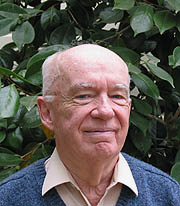August 14, 2006
Social psychologist returns to South Africa 50 years later
By Jennifer McNulty
An expert on intergroup relations could find the world a disheartening place lately, but research professor Thomas Pettigrew reports that South Africa has made great progress since apartheid ended in 1994.

Thomas Pettigrew |
“They’ve only been at it 12 years, and the jury is still out, but the progress I saw was amazing,” said Pettigrew, a leading expert on racial prejudice who recently returned from nearly a month in the country. “Contact between the races was very polite and a bit formal, as people don’t quite know how to act with each other. But polite beats anything else but warm.”
Pettigrew returned to South Africa to address an intergroup relations conference marking the 50th anniversary of the four-month visit to South Africa by his mentor, pioneering social psychologist Gordon Allport. Pettigrew, a graduate student at Harvard University at the time, accompanied Allport, who had just published The Nature of Prejudice in 1954.
Pettigrew and his wife, Ann, visited three universities and traveled extensively throughout the country, talking with South Africans of all races to assess the climate. About 80 percent of South Africa’s 45 million people are black, 9 percent are white, 9 percent are “colored,” a term that refers to people of mixed races, and about 2 percent are of East Indian descent, he said.
“We were watching the interactions—it’s my business to look for trouble, after all—and we didn’t find much,” said Pettigrew, who shared his impressions during a recent interview.
Pettigrew’s observations were informed by social psychology’s contact theory, which postulates that prejudice is reduced when people of different races interact with each other. “Apartheid restricted contact, and what little contact there was took place under the most hostile and negative circumstances, which accelerates prejudice,” he explained.
Among academics Pettigrew met, the African, colored, and Indian faculty reported that they were generally treated quite well but encountered problems from some older white faculty, who viewed them as incompetent, said Pettigrew. “Age is a big factor, with older people--products of apartheid—having some trouble accepting their new colleagues,” noted Pettigrew. In response, the government lowered the mandatory retirement age from 65 to 60 to help move out the resistant older generation, added Pettigrew.
South African universities have adopted affirmative action policies modeled after U.S. programs, and American universities could play a major role by providing graduate education that would help South Africa meet its surging demand for medical doctors, lawyers, and professors, said Pettigrew.
“As whites retire or leave the country, their replacements will have to be African, colored, and Indian,” said Pettigrew. South African universities can meet the needs of undergraduates, but there are too few schools offering advanced degrees.
Touring urban and rural areas, including Soweto, the infamous township on the outskirts of Johannesburg, Pettigrew saw the country’s vast shortcomings.
“Using its limited funds, the government is trying first to bring electricity and water--and then housing--to the reserves, locations, and villages where millions of underserved Africans live,” he said. In Soweto, where Winnie Mandela lives in a “palatial” home, some sections looked “decent to fairly prosperous, but there are still shanties as far as the eye can see.”
Pettigrew asked many South Africans about the African National Congress, the black-dominated majority party that now dominates the government. “I was encouraged that they still had hope,” said Pettigrew. “They’re being more patient than you might think.”
Johannesburg is plagued by very high rates of crime, but an African middle class is emerging. “It’s very small, but you can see it expanding before your eyes,” said Pettigrew. “As one African told me, ‘We are a first and a third world country at the same time.’”
Pettigrew likened race relations in South Africa to Northern Ireland, where “people want the troubles to be over.” The British government is investing in programs that increase positive contact among Catholics and Protestants, and studies by social psychologists have documented much stronger positive effects of intergroup contact than experts predicted.
Pettigrew’s research has focused for 20 years on race relations in Europe. “We do have our bright spots in the world, although Europe isn’t one of them,” he said. “Threats and fear are really generating prejudice and discrimination. Attitudes have been hardening throughout Europe.”
“That’s why it was nice to be in South Africa—to see something good going on,” said Pettigrew. “I expected it to be better than it was 50 years ago, but not as far along as it was. It is Nelson Mandela’s dream to build a rainbow nation and show the world that one of the most diverse countries can make it and get along. So far, so good.”